A few days ago a TV station in my country aired the rebooted Planet of The Apes series (one film per day). That led me to watch the original film from 1968 since it’s been a long time since I saw it and, in fact the film turned 50 years old this year! So it couldn’t be a more appropriate time to watch it. Shortly after I posted my capsule review of the original Planet of The Apes on my Facebook page, some of my friends encouraged me to watch the entire “classic” franchise which consists of five movies. This came as a surprise since, to be honest, I’ve seen only one sequel from the 70’s era, so it was a good opportunity to look at them as well as celebrate this cutting edge franchise that changed the definition of Sci-Fi forever…
Before we take a brief look at each film, I have to put the super cliche “Spoiler Alert” tag here. I understand that we all know what happens at the end of first film since it’s been shown everywhere at this point (from the Apes musical on The Simpsons to the DVD box cover!). Seriously. Some DVD releases of the original Apes film shows the ending twist on the front cover! Yet the events in this film links to the second entry of the series, so sooner or later I might reveal the ending of a particular film. Just be forewarned.
Planet of the Apes (1968): Let’s begin with the groundbreaking film that started it all and which definitely was ahead of its time. The story here is simple. Four astronauts (three men and one woman) travel into space to explore. In the year 3978, they finally land on a strange new planet but unfortunately the female member of the team has passed away due to a shuttle system error. The three surviving crew members roam around this planet and hope that they will find life there. What they don’t know is that there is a totalitarian system run by Apes and other terrifying facts waiting for them to discover. To quote the trailer: “The world he finds out of the galaxy will challenge every idea you ever had about civilization. The planet where man is the lowest order of living and the superior beings are…apes! They build the cities, make the laws, the gods, and control the gun.”
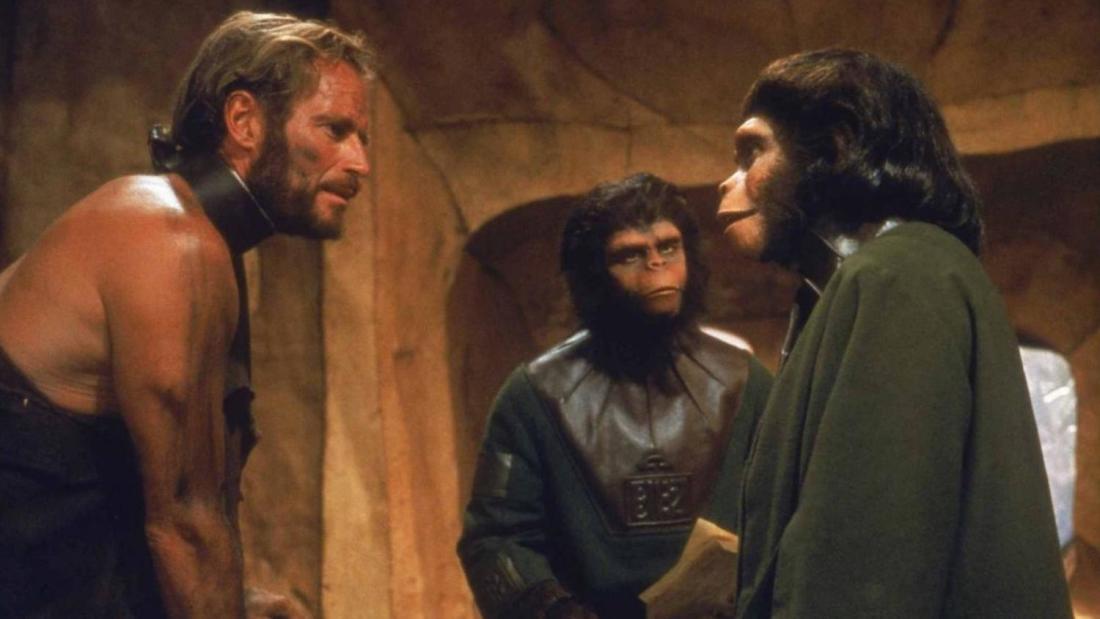
It’s actually a slowly paced film, but it’s the slowness that helps build the characters so we understand how they behave. In fact, we don’t see a single ape until 31 minutes in. The first part is largely spent on the three surviving astronauts and we get to know each of them. Our hero, Taylor (played by the late great Charlton Heston), is a sort of an anti-hero. He thinks about colonization of the planet and he’s pretty down on mankind in general, so he wants to start a new life. As the story progresses, he’s shot in the throat by the apes and, therefore, it’s pretty hard to communicate, especially with the intellectual chimpanzees. He’s calm and friendly at first, but after being tortured and caged for quite a while he becomes more and more disillusioned with everything. Thus, it explains why the legendary “Take your stinking paws off me, you damn dirty ape!” line became a legend. Luckily, he learns that “Some apes, it seems, are more equal than others”, just like in the film Animal Farm and the famous ending. Speaking of that, this whole movie reminds me of Animal Farm since they both deal with the dark side of humanity. While we learn about the failure of Communism and Stalinism in Animal Farm, the Apes movie reflects on the topics of slavery, colonization and how intelligence and facts become a danger in a totalitarian society. Also explored is the erasing of history in order to control people, faith vs. science, stereotyping and how a simple man can turn into a beast through variety of events (this leads us to the downfall of civilization). These are hard-hitting topics even for modern times, but thanks to the intelligent script and intense storyline, it’s one of those films that changed public opinion on the Science Fiction genre since there’s no lighthearted good guy vs. bad guy set up or the typical space adventure. It’s actually a dark look at humanity set in an alternate future. Also, it reflects what Sigmund Freud told us long time ago that the human society is driven only by two things: sex and violence.
Overall, this is one of the best Sci-Fi films of all-time due to the unusual setting and strong characterizations that can still leave us speechless after watching it today. Strongly recommended.
Beneath The Planet of the Apes (1970): The story for this sequel continues after the legendary twist of the first film. Taylor and his friend Nova travel to the forbidden zone and Taylor somehow goes missing. Meanwhile, another explorer named Brent lands on the planet to find Taylor. Later, he will learn about the difference between the peaceful chimpanzees and violent apes, he will find the ruins of the New York City underground and discover a group of mutants who use their psychic powers to control their opponents.

With this interesting background story, the first sequel is supposed to be as strong as the original one. Unfortunately, the characterization is pretty bland. Besides Taylor, who appears in only first and last scenes, there’s no other character that I can say that I like. Plus, the villain is quite annoying. Although it reminded me of the Spectre organization and Blofeld in the James Bond franchise (since they both want other parties to fight each other while the organization just sits back and watches everything crumble), I wanted more explanation on them since they are survivors of the war, but due to radioactivity, they were changed into mutants…but why do they hate real humans all of sudden? I know that they want to fight the Apes since they believe that the Apes are responsible for the Earth’s downfall, but I don’t understand why they have to control Brent and Taylor’s minds to make them fight each other.
On the other hand, it references the counter-culture movement quite well since there’s a scene in which the chimpanzees protest against the gorilla’s plan to goto war. It also has an interesting satire on glorifying war since the mutants worship a bomb, literally. Plus, the ending is almost as good as the original but should’ve ended the story. I mean, how can you continue on when Taylor is shown to be sick of the apes, the mutants, and humanity in general, so he blows up the entire planet? You can’t!
To sum it up, if I watch this again, I will just fast-forward to every scene that has Charlton Heston in it. Other than that, it’s mediocre and pretty bland, to say the least. It might be okay to watch once.
Escape from the Planet of the Apes (1971): As I said, there was no real way to continue the franchise but someone at Fox did! What we have here is not only a bizarre sequel compared to the previous one, but also, to me, the BEST sequel of the franchise.
Three chimpanzees, Cornelius, Zira, and Dr. Milo somehow (I repeat, somehow) resurrect the spaceship that is sunk in the lake in the first film. They repair it and fly off the planet right before the Earth is blown up. Due to the massive shock wave, they are sent back in time to 1973. They land near Los Angeles but they are greeted warmly. Although Dr. Milo is killed in the zoo (by the animals), both Cornelius and Zira are excited to dress like humans and learn how to do things like humans do, while people are amazed by the fact that these apes can talk. Unfortunately, Zira and Cornelius are interrogated by government agents and they learn that the apes will roam the Earth soon. In fact, let’s hear what Zira, Cornelius, our villain Otto, and interrogator have to say about this….
Cornelius: Well, it began in our prehistory with the plague that fell upon dogs.
Zira: And cats.
Cornelius: Hundreds and thousands of them died. And hundreds and thousands of them had to be destroyed in order to prevent the spread of infection.
Zira: There were dog bonfires.
Cornelius: Yes. And by the time the plague was contained, man was without pets. Of course, for man, this was intolerable. I mean, he might kill his brother, but he could not kill his dog. So humans took primitive apes as pets.
Zira: Primitive and dumb, but still twenty times more intelligent than dogs or cats.
Cornelius: Correct. They were quartered in cages, but they lived and moved freely in human homes. They became responsive to human speech and, in the course of less than two centuries, they progressed from performing mere tricks to performing services.
Interrogator: Nothing more or less than a well-trained sheepdog could do.
Cornelius: Could a sheepdog cook, or clean the house, or do the marketing for the groceries with a list from its mistress, or wait on tables?
Zira: Or, after three more centuries, turn the tables on their owners.
Hasslein: How?
Cornelius: They became alert to the concept of slavery. And as their numbers grew, to slavery’s antidote which, of course, is unity. At first, they began assembling in small groups. They learned the art of corporate and militant action. They learned to refuse. At first, they just grunted their refusal. But then, on an historic day, which is commemorated by my species and fully documented in the sacred scrolls, there came Aldo. He did not grunt. He articulated. He spoke a word, a word which had been spoken to him time and again without number by humans. He said: “No”.
Therefore, after Otto accomplishes the lobbying task, the US President orders that the baby inside Zira must be terminated and they will later be chased by army.
Although the first 30 minutes has several comedic moments (like how both apes try to dress like humans or take a bath), the film still has dark aspects since it’s the reversal of the ape world. While humans are captured for experiments and tortured by apes in first two films, the animals, especially our lead apes, are subjected to unethical interrogations and are caged as well. Other than that, Escape has very intelligent text on infinite regression, provides a backstory on how the apes conquered Earth (which reminded me of what AI could do in the future just like in first two Terminator films. Sigh) and illustrates government manipulation to create a war (by thinking that pacifist Chimpanzees and fascist Gorillas are the same and ignoring the whole aforementioned backstory). It’s not as depressing as the first one, but parts of the film had me on the edge of my seat.
To sum up, this film is like a mix of the original The Day The Earth Stood Still and the original Day of The Dead since our heroes come to warn us and are in the middle of a conflict between the military and the scientists. Highly recommended.
Conquest of the Planet of the Apes [Unrated Cut] (1972): After Cornelius and Zira get killed in last film and we learn that their baby (named Caesar) is actually safe, the story fast forwards to the year 1991, in which something bad has happened. Armando (Ricardo Montalban), the owner of the zoo and Caesar, say that…
“[Dogs and cats] all died within a few months, eight years ago. Every dog and cat in the entire world. It was like a plague. The disease that killed them was a mysterious virus brought back from outer space by one of the astronauts. […] We were immune. And so, it was discovered, were simians, even the smallest ones. That’s how it all began. Humans wanting little household pets to replace the ones they had lost. Then, when people realized how quick they were to learn, how easy to train, the pets became larger, and larger, until now.”
I’m not sure whether it’s easier to spend a lot of money to train apes rather than humans, yet everyone in the city uses apes for their businesses as maids etc. They are chained up all the time and if they behave badly, they are beaten. Since Caesar can’t stand cruelty against apes, he accidentally shouts out…which makes him dangerous to the government since they still remember what Zira and Cornelius said years ago. So Armando is interrogated and he later commits suicide to hide what he knows about Caesar. Meanwhile, Caesar is trained by the authorities and later becomes the Governor’s pet. What the Governor doesn’t realize is that Caesar is planning not only revenge against the group of people who made Armando kill himself, but also an Ape revolution.
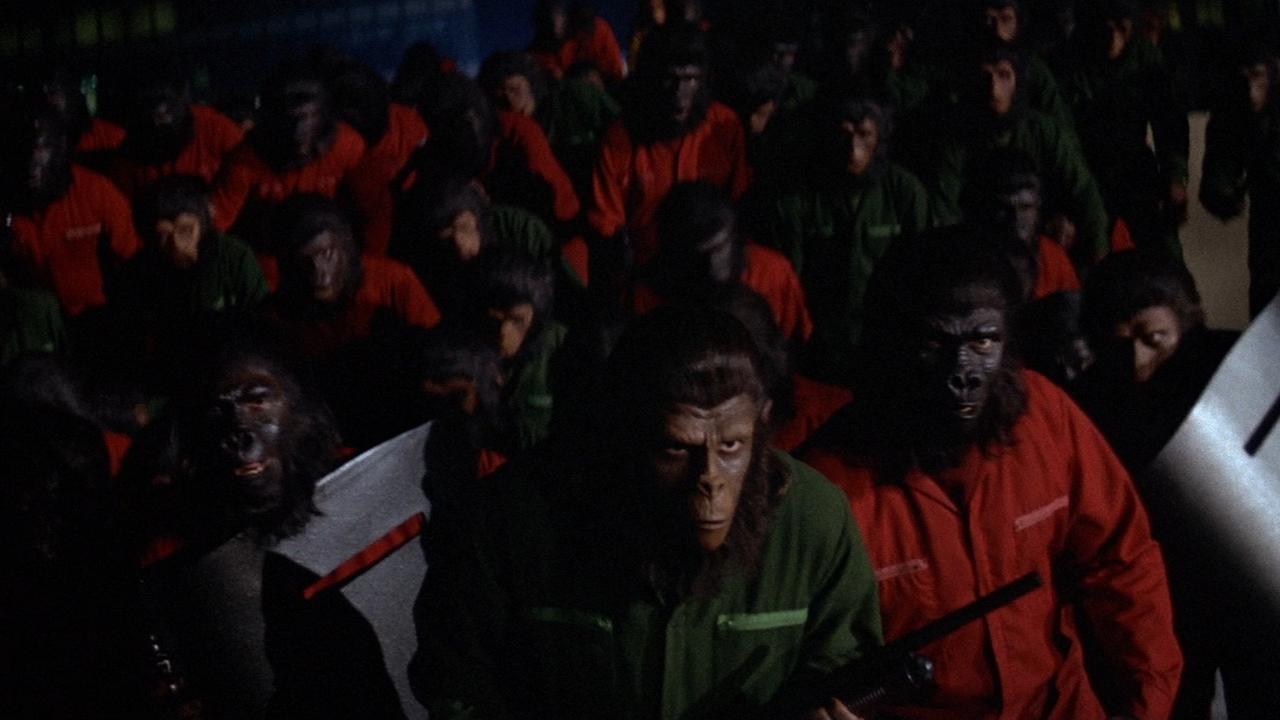
While there’s not a lot of action in this film, it’s surprisingly intense since the story reflects slavery and the cruelty that humans faced not only in our history, but also what happened in the first two films as well. It also has minor themes such as the human workforce being replaced by apes. As you can see, the reason I mention the “unrated cut” is because this version has more bloody sequences than the theatrical cut. The bloody effects can be seen during the climactic scene in which the apes and the police are fighting. Some of them look hilarious by today’s standards, but it was considered gory in the 70s. Most importantly, this version has a totally different ending. While the theatrical cut has the ending speech from Caesar to warn the humans, in this version, the gorillas brutally murder the Governor! To me, this is the better ending since it foreshadows how violent the gorillas in this franchise are and also tells us that there’s not much difference between humans and apes.
Although the pacing is rushed in some parts and I’m not convinced that the LA police force is THAT small, Conquest is an interesting entry in the series since it shows the turning point in which the apes are rising and the humans receive their own karma. Highly recommended.
Battle For The Planet Of The Apes (1973): The final sequel of the classic franchise. The infamous one. After we hear the backstory of Escape and Conquest in the beginning of this film, the story kicks in. It takes place in a community in which apes and humans try to live peacefully. Apes are taught that “Ape must never kill ape” and humans learn that they must not yell “No!” since it might trigger the apes’ bad memories from the Conquest period. While there’s a conflict between violent gorillas and peaceful chimpanzees, Caesar wants to learn about his past, so he gets MacDonald, the only survivor of last film, and an orangutan named Virgil go to the archive, which is located under the ruins of LA. Unfortunately, the mutants live there and they can’t wait to wage a war on the apes.
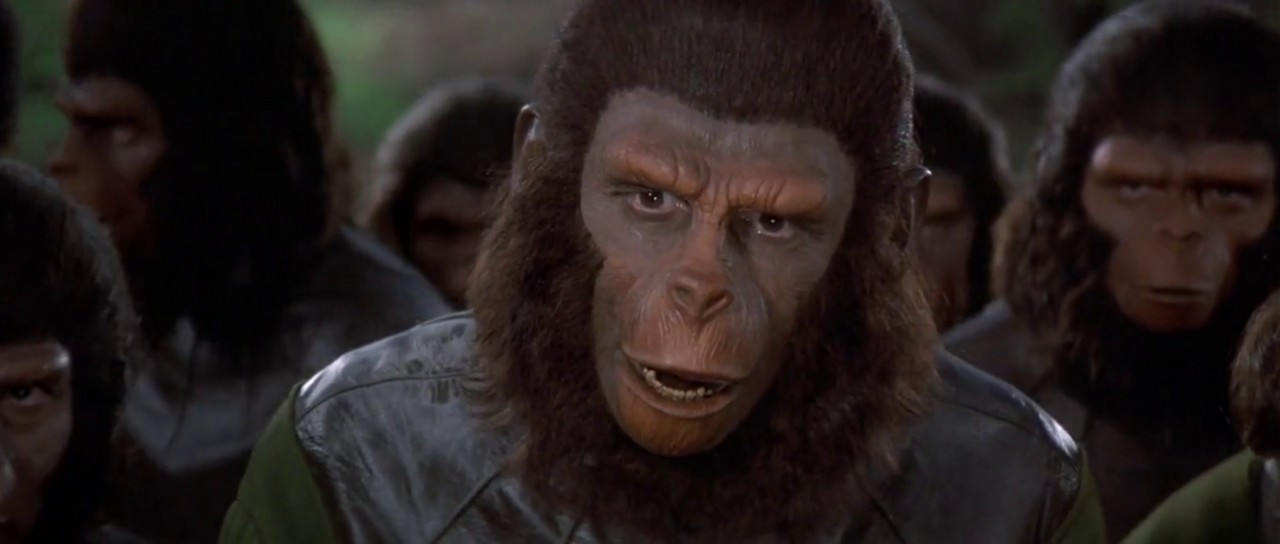
This is basically 80-90% of the storyline. Although it references Animal Farm (through the aforementioned line, which is similar to “No animal shall kill any other animal” in the book) and the Vietnam War (since the mutants uses trucks, tanks, and modern vehicles, while the apes have only guns and wooden bunkers. Sound familiar?). Most of the film is quite bland and not that memorable. Actually, Caesar’s son gets killed by a gorilla, but I didn’t feel sad since there’s no buildup or interesting background on the character. To make things worse, the ending is pretty weird. Since the film is actually a flashback told by an ape in 2670 A.D., the final scene reveals that human kids and apes are living peacefully! I know that the first film takes place in 3978, but I think the downfall of humans might come quicker than 2670. I forgot to mention that this is the ONLY film in franchise that has a happy ending. Thus, many people have referred to it as the kids film or “Disnified” film of the series.
In the end, this film is mediocre at best. It’s not as bad as what some critics have said, but there’s not much you’ll be missing.
————————————————-
CONCLUSION OF THE APES: I’m surprised at how ahead of its time and how intense this series was. The Planet of The Apes franchise still serves as a cautionary tale for us to live in peace and avoid being angry and use violence like what some humans and gorillas do. But as I said before, Sigmund Freud told us a long time ago that human society is driven only by two things: sex and violence. How long until our planet turns into a chaotic place like some of these films? It’s up to us and our children to answer this question.
Buy The Planet of The Apes 50 Years Collection on BluRay


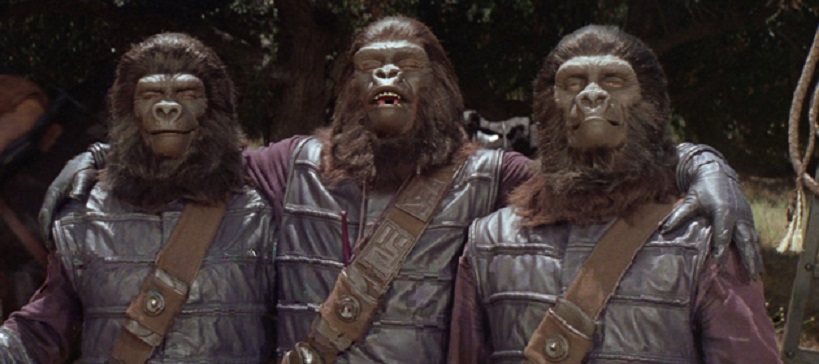
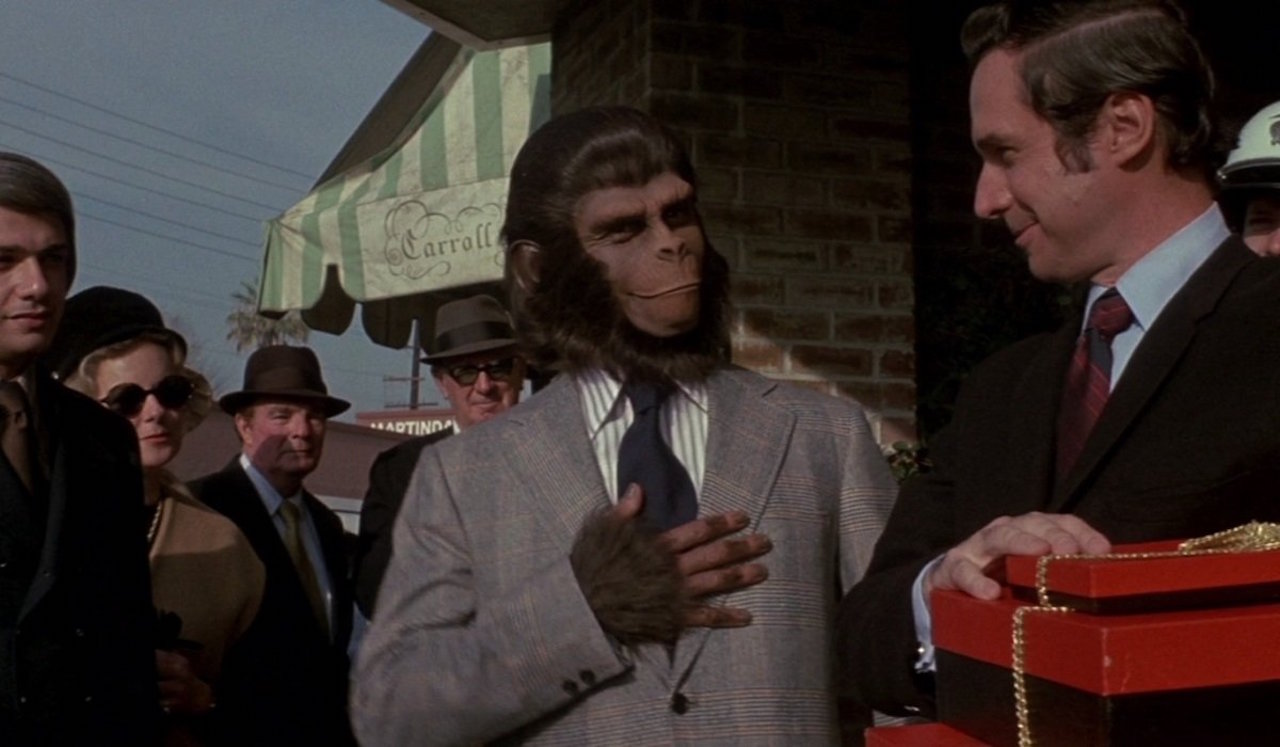

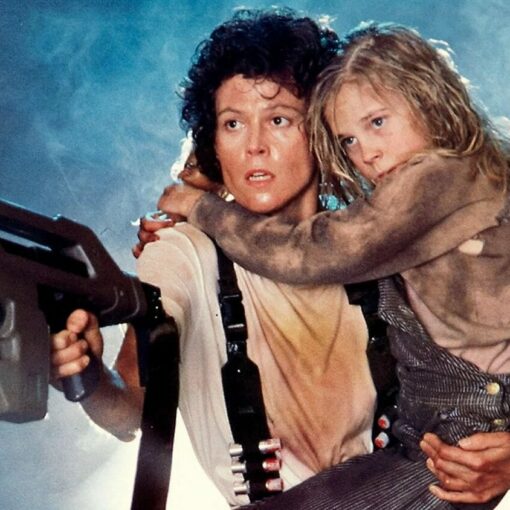
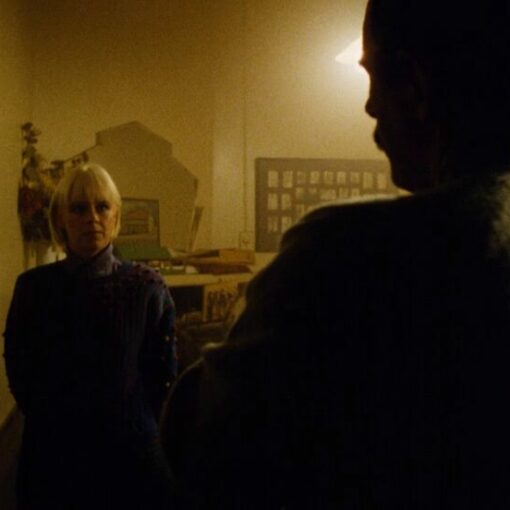
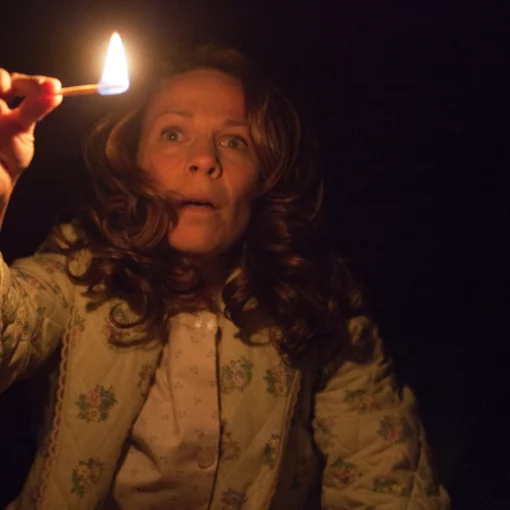
One thought on “PLANET OF THE APES: The Classic Franchise Retrospective”
Yes very good movies the planet of the apes is a reflex of our world